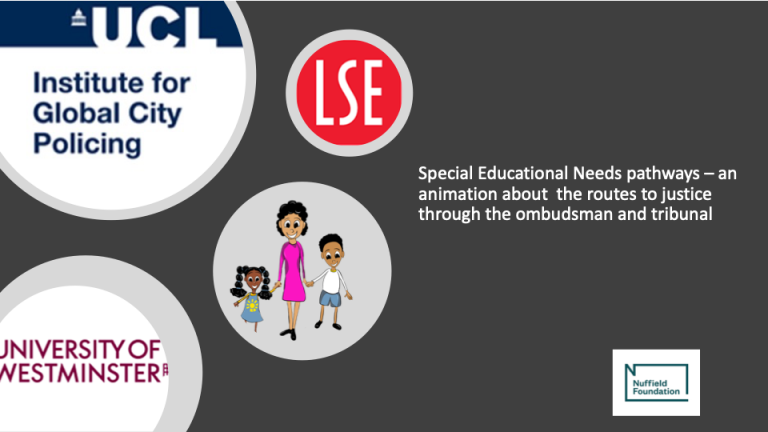Delivering administrative justice after the pandemic: What can we learn about digitalisation and vulnerable groups?

- Project brief: This project will be examining the administrative justice system and the impact of COVID-19
The pandemic forced the justice system, where possible, to go digital. This rapid and radical shift presents a huge opportunity to draw positive lessons for the future. Several projects are already underway to understand the impact of the pandemic on specific judicial systems, such as family courts.
The research team will be examining the effect of rapid digitalisation on the delivery of justice, identifying the effects on access for marginalised groups and exploring how trust can be built and sustained in parts of the justice system affected by the pandemic. This will be done by partnering with housing, special education needs and disability organisations. These are areas of law which are exceedingly important during a pandemic and serve as an excellent platform to explore trust and access to justice.
The Housing Ombudsman, Property Chamber, Special Educational Needs and Disabilities (SEND) tribunal and Local Government and Social Care Ombudsman (LGSCO) are the four organisations that have partnered with the research team. This partnership will help the research team collect quantitative and qualitative data and work towards completing their three stages of work:
- Mapping pathways to justice and determining the impact of digitalisation on how people interact with partner organisations;
- Conducting interviews with practitioners and marginalised groups and building an evidence base for why and how marginalised groups do or don’t access justice;
- Surveying service providers and service users and interpreting the gathered data. This will help clarify people’s trust in the justice system during and after the pandemic.
Each stage of work will have corresponding public outputs. Upon completion of mapping pathways, a visual map and interim report will be published alongside an animation for the general public. The interviews and survey results will be interpreted and published in factsheets and a database. Upon completion of all work, a public report will be published containing the findings and policy recommendations. A workshop will be held to present findings and engage with stakeholders.
Learn more on the Nuffield project website.
- People
- Professor Naomi Creutzfeldt, University of Westminster
- Professor Ben Bradford, University College London
- Dr Arabella Kyprianides, University College London
- Heidi Bancroft, JUSTICE
- Professor Jonathan Jackson, London School of Economics and Political Science
- Ash Patel, Nuffield Foundation
- Maps
Take a look at the Map of the Follow Help-Seeker Journey (PDF)
- Report
Read the final project report (executive summary)
- Videos
Watch our Access to Ombuds and Tribunals for SEND video
YouTube Widget Placeholderhttps://www.youtube.com/watch?v=aW1UPrpBJ7U - Booklets
- Surveys
We would like to know your experience with the SEND Tribunal or the Ombudsman to challenge/ complain about a SEN decision during the pandemic; or your experience with the Property Chamber or the Ombudsman to help you with a housing issue during the pandemic. Please share your experience by completing the anonymous surveys here:
- I have been in touch with / been through the process with the LGSCO
- I have been in touch with / been through the process with the SEND Tribunal;
- I have been in touch with / been through the process with the Housing Ombudsman;
- I have been in touch with / been through the process with the Property Chamber.
If you are an advice provider, please fill out our anonymous survey to help us understand how you experienced your interaction with clients.
A report about the findings will be published and can be sent to you. For any questions please contact Professor Naomi Creutzfeldt at n.creutzfeldt@westminster.ac.uk.
 Close
Close

